‘1, 2, 3…’ This hill is so steep, my pack feels like a thousand pounds pressing me towards the earth, and I’m blowing like an ancient racehorse desperately trying to recreate his youth. I’ve been reduced to counting my steps just to keep moving. Maybe counting steps is better than the earworm plaguing me so far–hearing the 80’s pop song “I Ain’t Missing You’ for the billionth time on repeat in my head is downright painful. When I get to 100, I allow myself to pause, take three big breaths, then try to keep up with my companions. Going into this trip, I knew I wasn’t in the best shape of my life, but I’d thought I was better than this. After all, I’d been going out every day on a four-mile trek up and down my dirt road, my pack loaded with 46 pounds of weight plates and gear, but obviously, that wasn’t enough. Yes, the two at the front bounding up the hill are in their twenties, but the other two women are around my age and both dealing with knee problems, so age wasn’t a good excuse either.
No, I had to face facts on day 3–I’d let myself go.
How humbling. No, humiliating. And it wasn’t just my fitness level–it was those ten pounds I’d stress-eaten my way into last fall, helping setup Team Rubicon’s Hurricane Harvey response. I should have ditched those this spring, but I hadn’t, and now I was paying the price.
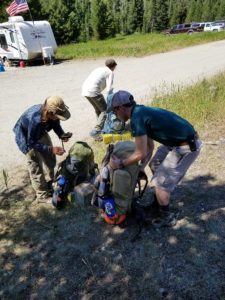
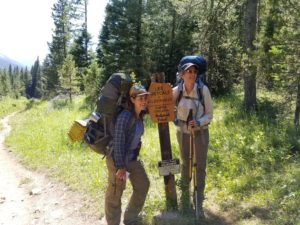
But back to day one. I meet my University of Montana Wilderness Institute trip leaders and another ‘citizen science’ volunteer in Missoula. Caitlin, an enthusiastic intern, and the WI Director, Lisa, are leading our trip. I’ve met Lisa on previous occasions, and she came out on a prior trip for a couple of days, so I’m happy I’ll get to know her better. Caitlin is like most of the WI interns, a delight and far deeper than an initial meeting conveys. Beth Anne, our third from Missoula, works as a producer and engineer for a local radio station. We have a four-hour trip to the trailhead, so we get to know each other, telling stories about previous backpacking trips and our lives. After crossing through Ted Turner’s Flying D buffalo ranch to reach the trailhead, we meet Garrett, our fifth. He’s a cheerful young man who’s recently discovered that working in the wilderness is his passion. We’re all happy to hear that since it’s not the easiest way to make a living.
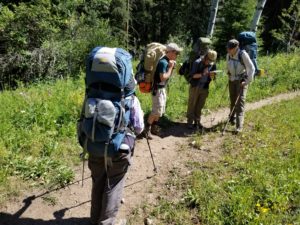
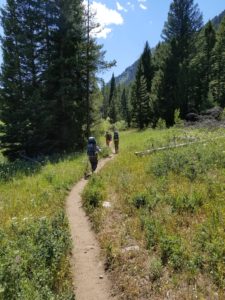
We split up the group gear and dinners, the twenty-somethings taking the heaviest items, and head up the trail. It’s hot and rather dusty; this is a popular trailhead for horse folks, their mule trains pound the trails into wide, dusty boulevards until they settle down into a string. We immediately run into a couple of groups coming out–one group carrying skis and snowboards. There’s a strip of snow called The Blaze–a popular ride for crazy-enthusiastic winter sports lovers. I love skiing, but not enough to pack my gear for miles and miles up a ten-thousand-foot high mountain. They’re still happy, so I guess it’s worth it to them.
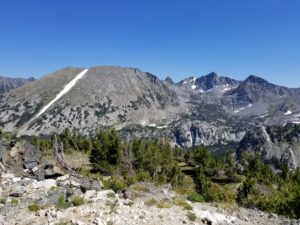
A big part of our mission on this trip is social monitoring for the Forest Service, so we note the number in each party, how many nights they stayed, and what trailheads they used. Most backpackers are happy to pause and chat about these subjects, so it’s not a difficult chore. We continue up, a gentle slope along a rushing stream, abundant undergrowth and lots of pines and spruce shading us. The pace is fast but doable, and we quickly reach our destination, just a fork in the trail. We pitch tents a little short way from the intersection and take food down to the riverside to prepare dinner. It’s important in the wilderness to cook far from where you are sleeping–you don’t want to attract bears or other predators to your sleeping bag.
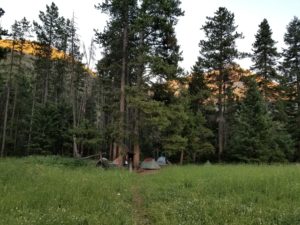
Over a good dinner of pesto pasta (the WI supplies vegetarian dinners, volunteers pack their own breakfast and lunch) we get to know each other better and talk about our route and the details of social monitoring. The next morning, we pack up and start up the trail to Mirror Lake, which is a bit steeper, but not difficult. I find myself constantly pushing to keep up, though, which doesn’t bode well for the rest of the trip.
Mirror Lake is beautiful and mostly quiet. There are other backpackers, some who just want to be left alone, others happy to talk. We set up camp and take our newly-lightened packs for a trip up to Summit Lake. It’s steep, stiff hike and I find myself struggling. Lisa suggests the Beth Anne and I stay with her, while Garrett and Caitlin go ahead, mapping the social trails around Summit Lake.
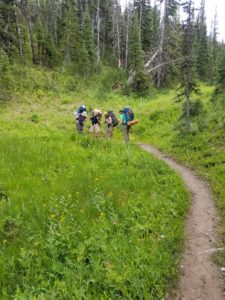
I reluctantly agree, knowing there’s a big, tough hike the next day and I’m already having a hard time. But it’s certainly pleasant to sit and contemplate the beauty around us.
The next day’s hike is downright brutal. We go back down fourteen hundred feet then up eighteen hundred, all in five miles. The trail up is rough and loose, with lots of rolling rocks, and very few switchbacks. Those extra ten pounds are killing me. At times, I think it’s literally. I’m happy to be in the back, where I can take those extra breaths every hundred steps.
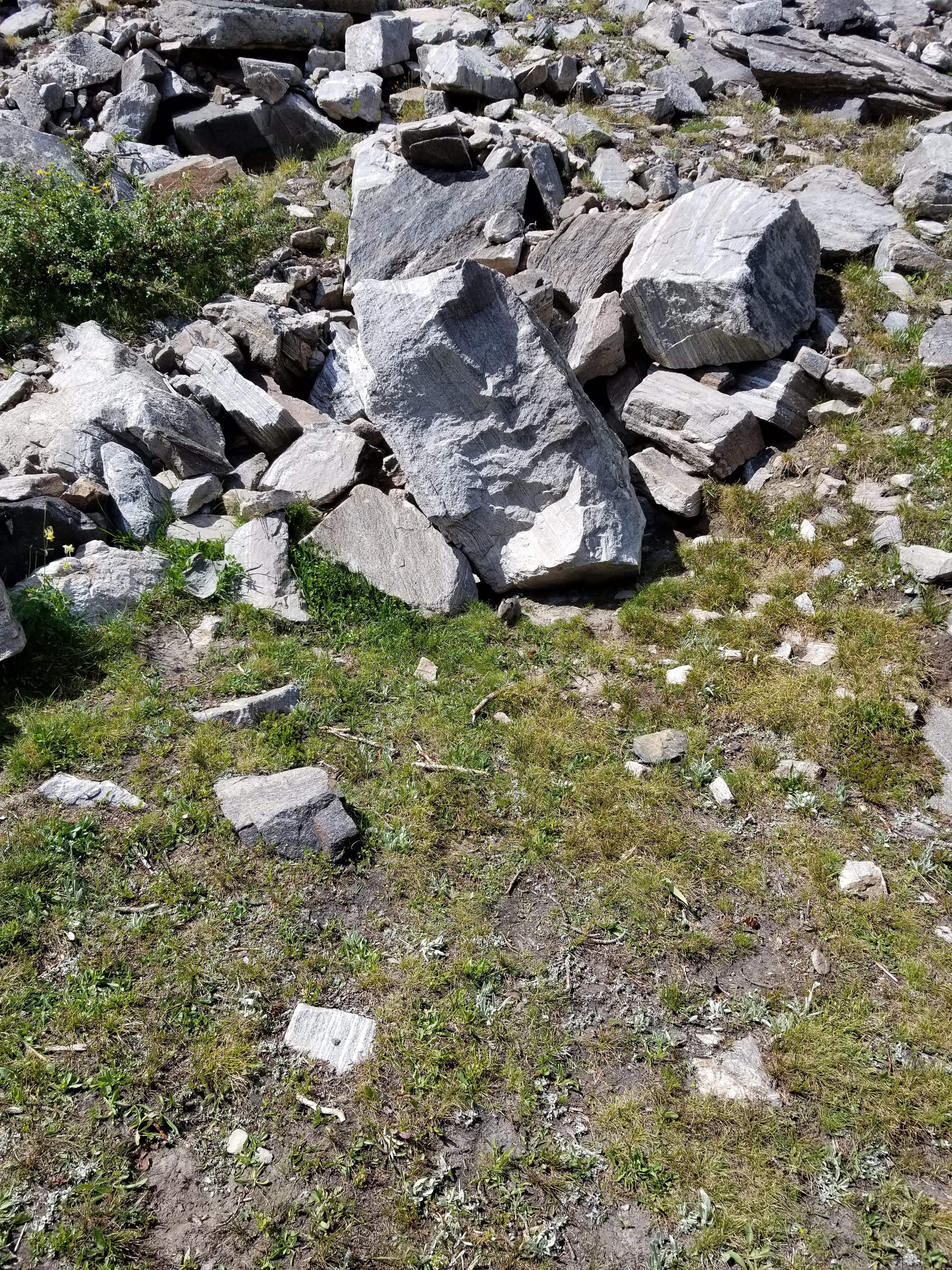
When we arrive at the Spanish Lakes, it’s mostly worth it. It’s a truly beautiful place, with stunning mountains, fish jumping, wildflowers blooming–but way too many people for me. There are people camped everywhere–and the only site available for a group our size is right by the end of the trail. I’m not complaining, though, because I can’t carry that pack any further. I’m exhausted and dehydrated. I gratefully set up my tent and collapse until dinner, thrilled we’re staying here two nights.
After dinner, the Forest Service Wilderness Ranger assigned to the area appears. Lulu is the only Wilderness Ranger in the entire Lee Metcalf Wilderness, so it’s fortunate we run into her and fellow FS employee Andrea. Lulu tells us our plan to spend the last night at Jerome Lakes might not be a good one. The trail to Solitude, and then Jerome, is worse than the one we just took. It’s steeper, rougher and rockier. Not only that, but we don’t have to go there–Lulu has already done the required social monitoring and trail mapping for the area, and she’d rather have our help in the Spanish Lakes area. After some discussion, we all agree to the new plan. I don’t want to agree, I want to see Jerome Lakes, but I know this is the smart thing to do.
The next day, we all help Lulu and Andrea with campsite cleanup. This is a messy, dirty job, digging all the ash out of every fire ring, searching for bits of unburned trash to pack out and dispersing the ashes around the area. We also deconstruct some of the fire rings, making them a more reasonable size for the amount of wood available. After lunch, we watch some semi-crazy folks jump off the high rocks at the far side of the main Lake, splashing down after an incredibly long drop, whooping with joy as they climb out.
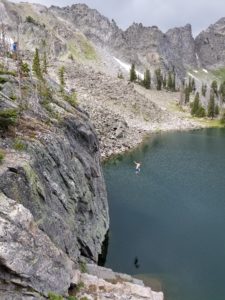
Then we head to the upper Spanish Lakes. Again, Lisa, Beth Anne and I do more campsite cleanups while our rangers and younger members head up to Beehive Lake to map the trails. I want to go, but know it’s a scramble, and I’m better off with a semi-rest day.
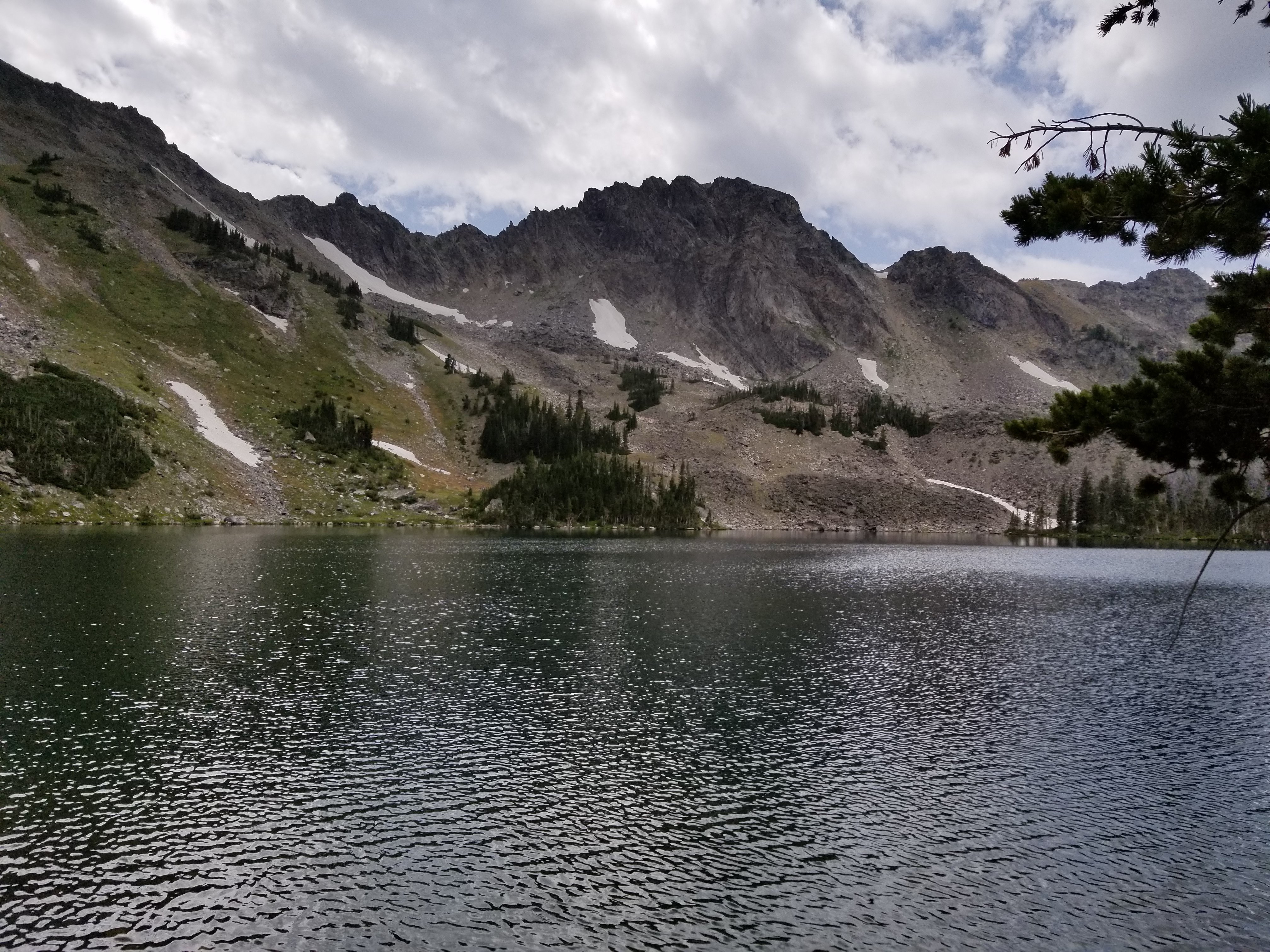
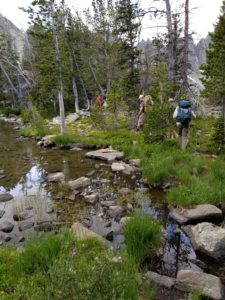
By the way, if you’re ever in the wilderness and tempted to burn something other than paper–don’t! Please. Cleaning up campfires is no fun at all, nor is packing out all that scorched trash. Also, use the proper method to dispose of your own waste–our most unpleasant discovery was a pile of human waste and toilet paper, left in a stack of rocks on a rock ledge above one of the upper Spanish Lakes. Lulu and Andrea had to figure out a way to transport and properly dispose of that waste–without a shovel. To the idiots who left that disgusting mess, I hope karma bites you in the ass very soon.
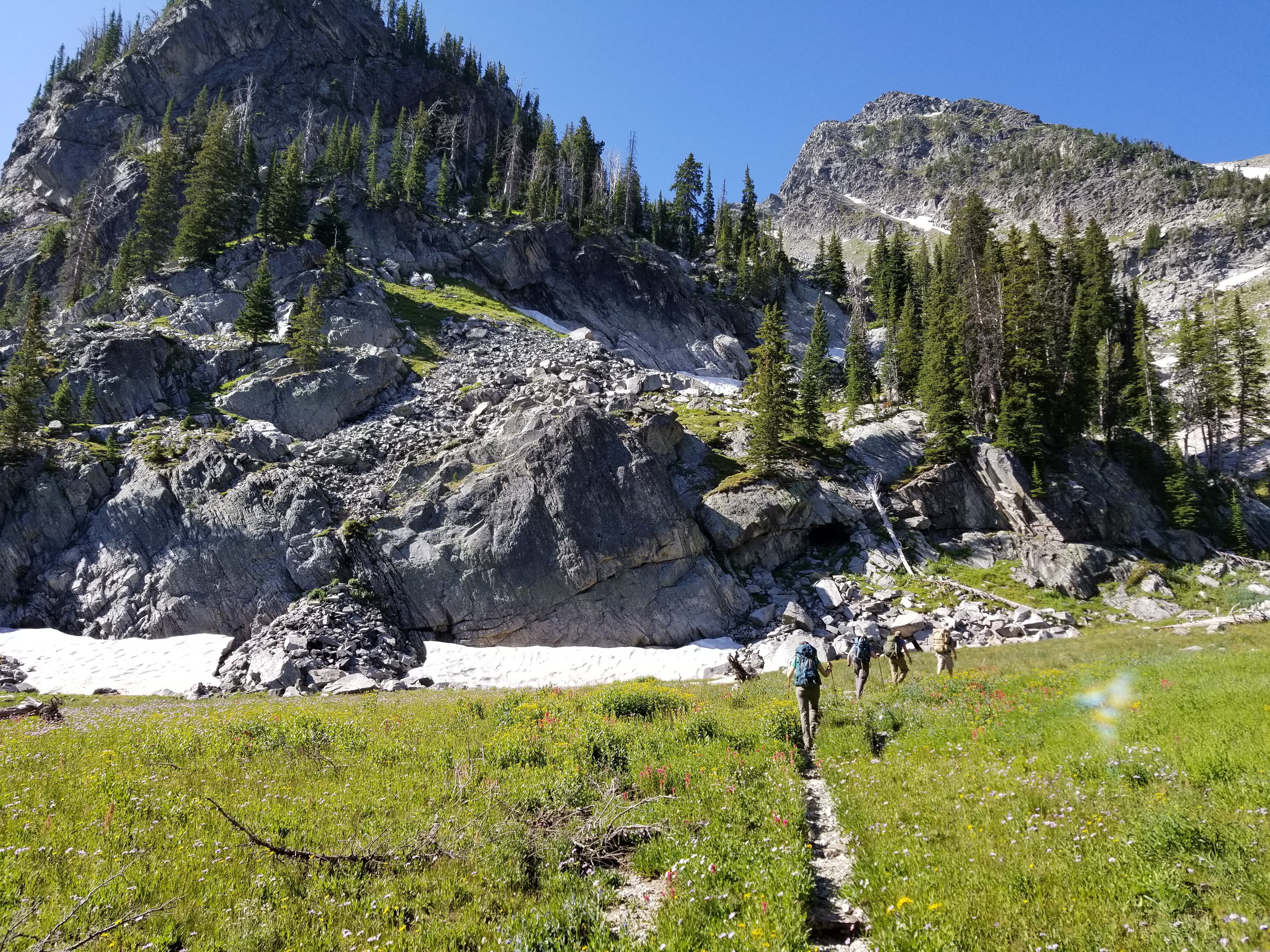
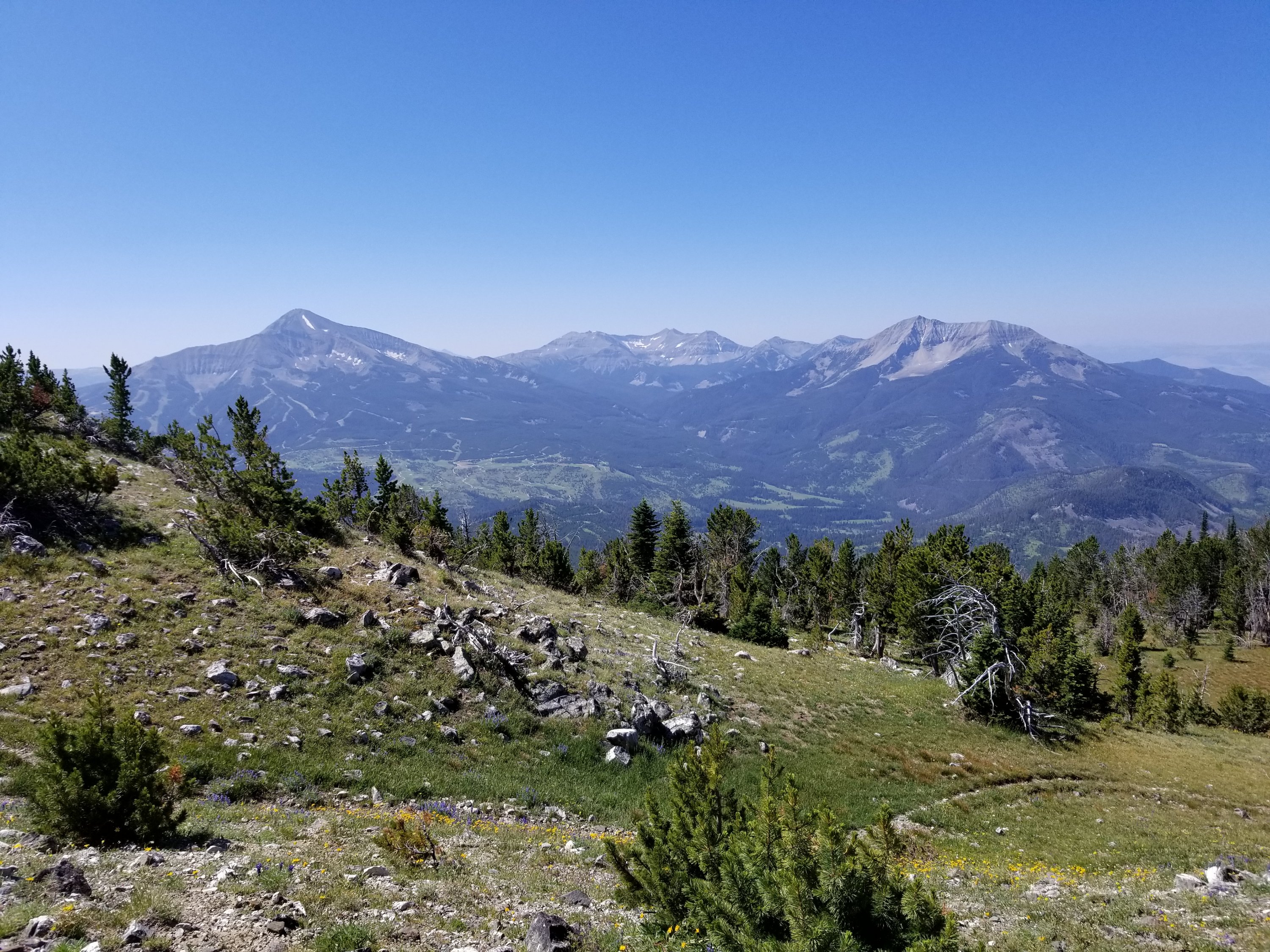
On our fourth day, we take a day hike up to Solitude Lake. The trail is steep and rough, and I’m glad I’m not carrying my full pack. Would I have made it? Sure. But I’d have been really, really slow. At the top, we can see Big Sky ski resort, and I can’t resist sending a text to the Amazing Sleeping Man with a picture. I get a picture in return of the Forest Service airplane he’s currently working on, the incredibly ugly Sherpa, and a picture of an increasingly rare WWII-era P-51 fighter plane, rolling down the Missoula taxiway towards takeoff. Both make me smile, and I’m torn between the desire to stay in the wilderness and go home. I also get a text from my Team Rubicon boss; it’s a selfie with a copy of my book! Jonas is the best boss ever!
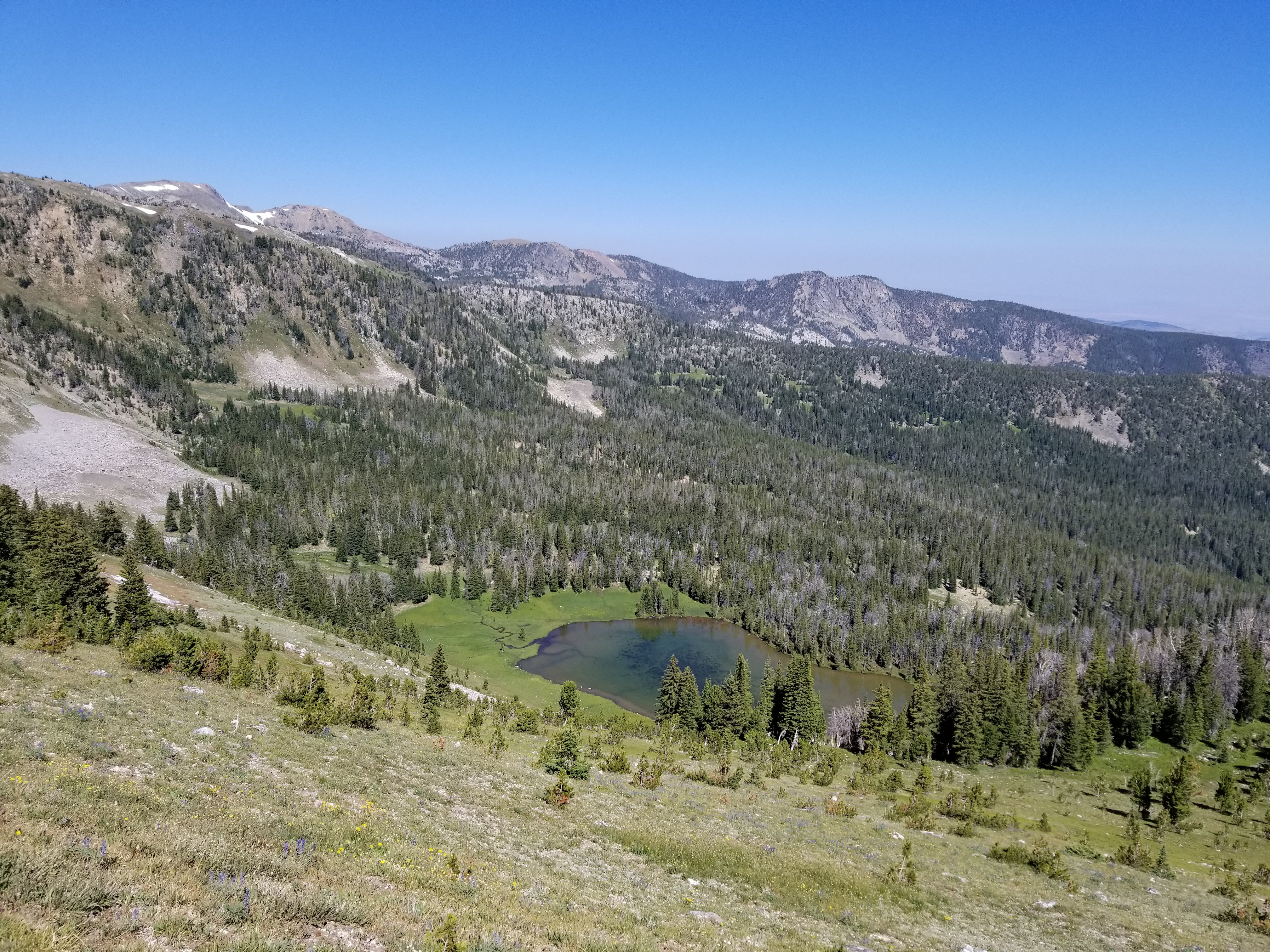
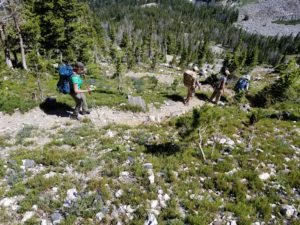
We hike down to Solitude Lake, an even steeper and more difficult trail, with lots of loose, rolling rock. At the bottom, the crew starts on another fire pit while I look for a lunch spot. Along the way, I talk to a couple about their trip so far. They’ll be joining us at Spanish Lakes. They have a dog with them. ‘Oh, don’t worry, he’s friendly!’ they say as she barks and growls, hackles raised, and they struggle to keep her back. No collar or leash to be seen. By the way, this is a very bad idea in the wilderness. There are bears, cougars, and lots of critters dogs love to chase. I smile, without teeth, and back away slowly.
We eat lunch, and again, Caitlin and Garett map the social trails around the Lake, while Beth Anne and I struggle upwards, Lisa encouraging us. I am truly grateful for Beth Anne’s presence on this trip–she is determined and cheerful despite her slightly wonky knee. I have no such excuse, I just keep gasping as I follow her inexorable path up. We talk to a group of teenage girls at the top–they’re one of three YMCA groups from Minnesota on ten-day backpacking trips in the area. We ask how they like Montana and get universally enthusiastic replies, which isn’t surprising. What’s not to like?
We return to the Spanish Lakes for our last night, plunging into the cold water for a refreshing dip. We have vegan mac and sauce with tuna for dinner and dark chocolate with almonds and sea salt for dessert. It’s delicious and filling–everything tastes better in the wilderness. After dinner, we build a small campfire in one our newly cleaned and reduced fire rings. We congratulate each other and our fabulous trip leaders give us ‘rock awards’ for various traits we’ve displayed over the trip. I feel a little guilty–I’ve slowed us and not been terribly useful on this trip–but I will gladly display my pretty olivine rock on my writing bookcase where I can look at it and remember the lovely scenery and great company. And maybe the weight of that rock will remind me I don’t need that extra piece of chocolate!
Heading for bed early, I’m startled awake by gunfire. Oh, wait, not gunfire. Whew. No, it’s ten at night, and some inconsiderate person is smacking sticks against rocks, undoubtedly to break them up for firewood. Really? Your fire is more important than everyone else’s sleep? Wow. The noise continues late into the night.
We meet a little earlier the next morning, all of us a little bleary-eyed. While we wait the for water to boil, a pair of gorgeous mule deer bucks visit.

It’s the perfect end to our stay, a reminder of why protecting wilderness is important, and how critical wilderness is to our health as human beings. If some don’t use the wilderness appropriately, it’s good to know there are organizations like the Wilderness Institute, and Forest Service Wilderness Rangers, all doing their best to keep the wilderness wild, if not pristine.
At the trailhead, we say goodbye to Garrett and take a final quick plunge in the river to cool off after the fast seven and a half mile hike out. The drive to Missoula is livened by podcasts and talk, and Caitlin’s slightly nervous driving. At our cars, we promise to share photos and other information and go back to our lives. I’m happy to be back home with the ASM, a hot shower, and flush toilet, but sad to leave the wilderness behind.
Oh, but I’m not! I’ll be doing another trip, this one with History Corps and Team Rubicon, later in August. Maybe I’ll ditch the last of those ten pounds, too.
Besides, I always keep a little wilderness in my heart. Even when I’m ancient and bedridden, I’ll be able to remember these trips and the joy of being in the middle of nowhere brought there by my own two feet. I recommend visiting your own wilderness, even if it’s just one in your mind.
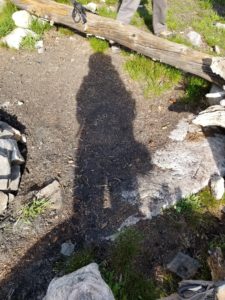
Excellent post. A few people who are horrified by the no full flushing toilet scenario, who just shake their head in bewilderment, and go “no way” to the camping concept!